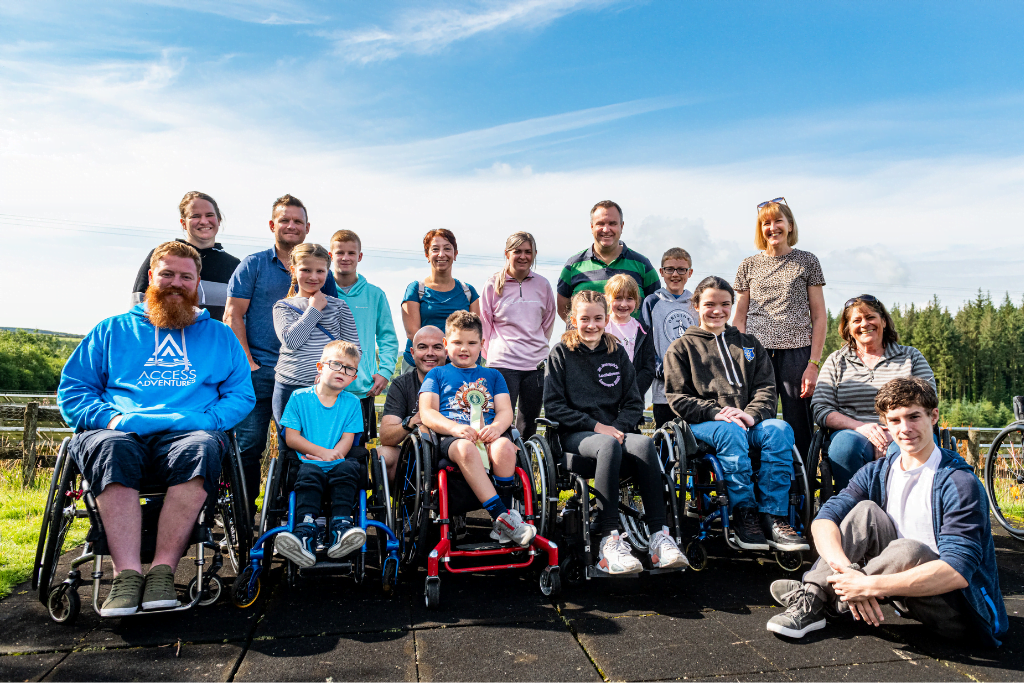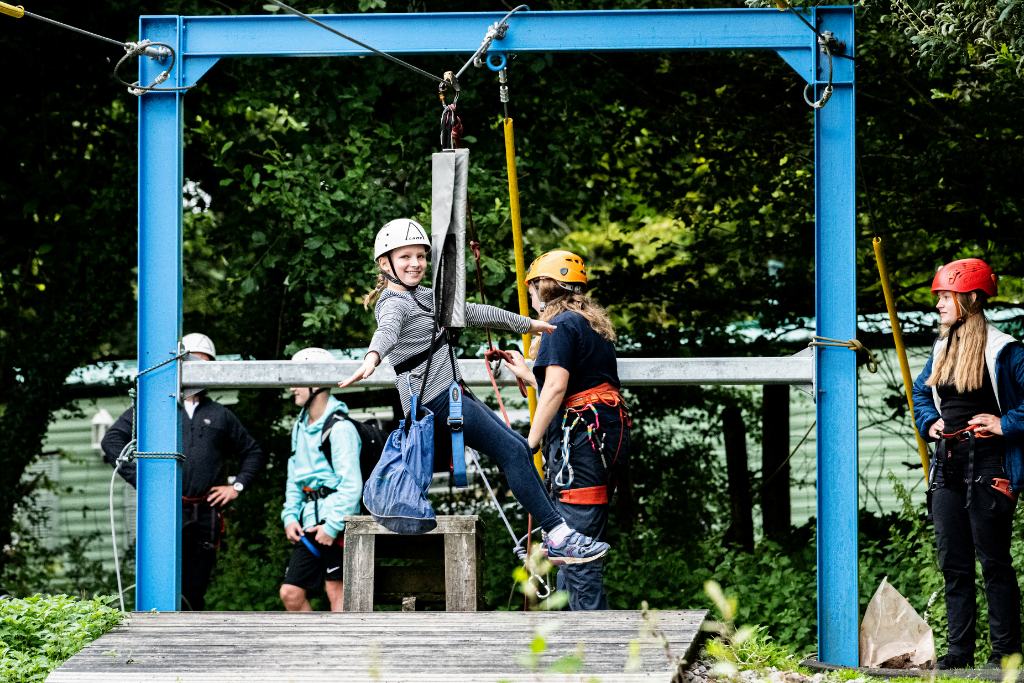Accessing school trips and activities
In the process of including children and young people with spinal cord injuries, schools will often focus on physical access and other adjustments inside school walls. However, for many children and young people, accessing school trips and experiences outside of school is equally essential to how included they feel.
“Inclusive education means to me as a parent of a disabled child that school trips would be thought out in advance, so that a wheelchair user like my son, would be able to access and get the most out of the trip just as somebody else who isn’t in a wheelchair.”
Janet, mum of son 17

All students are entitled to inclusion in school trips. The Equality Act stipulates that schools must not discriminate in the way they afford pupils access to a benefit, facility or service, which includes school trips. Treating a pupil less favourably, or policies and practices that result in pupils with a particular characteristic being treated worse than other pupils, can be seen as direct or indirect discrimination.
Anticipatory Duty
As per the Equality Act 2010 the duty to make reasonable adjustments in education is ‘anticipatory’. This means schools must consider in advance what they need to do to make sure all disabled pupils can access and participate in the education and other benefits, facilities and services they provide for their pupils.
Any organising or planning of trips and activities should plan for the inclusion of students with disabilities from the outset, and should ensure appropriate ‘reasonable adjustments’ to enable participation.
It is the school’s responsibility to fund these reasonable adjustments and they are never allowed to charge parents for them.
Pupils with special educational needs and school trips
The Equality Act 2010 and the Special Educational Needs and Disability Act 2001 (SENDA) have simplified and strengthened the discrimination laws which protect school pupils from unfair treatment.
It states that: “It is unlawful for a school or other education provider to treat a disabled student unfavourably”.
Such treatment could amount to:
- direct discrimination
- indirect discrimination
- harassment
And that: “every effort should be made to make school journeys accessible to all who wish to participate, irrespective of disability. Teachers should plan for inclusion from the outset, and should make appropriate ‘reasonable adjustments to enable the participation of disabled pupils.”
The Department for Education (DfE) has published statutory guidance on supporting pupils with medical conditions.
Supporting pupils at school with medical conditions, GOV.UK – DfE (Adobe pdf file)
Page 18 focuses on day trips, residential visits and sporting activities. It explains: “Governing bodies should ensure that their arrangements are clear and unambiguous about the need to actively support pupils with medical conditions to participate in school trips and visits, or in sporting activities, and to not prevent them from doing so …there should be enough flexibility for all children to participate according to their own abilities and with any reasonable adjustments.”
It says: “Consider what reasonable adjustments can be made to allow pupils with medical needs to participate “fully and safely” on visits Carry out a risk assessment with the pupil, his/her parents and relevant healthcare professionals. Plan the trip taking account of the steps needed to include the pupil.”
Schools must make any reasonable adjustments to ensure there is no discrimination. Despite legislation, many disabled students and their families still report exclusion from out-of-school activities.

A 2008 report commissioned by Back Up on the school experiences of young people with spinal cord injuries revealed that the ‘vast majority of young people and parents interviewed identified school trips as one of the most problematic areas of their mainstream school experience.’
The main barrier identified was lack of accessible transport. Some students reported being excluded from events altogether, and others attended events but had to take alternate transport in cabs or their parents’ cars. Because school trips are often very social events, this separation was for them an isolating experience.
“With secondary school, I have to go in a black cab – it’s not nice because you feel isolated, kind of thing. The others go in a school mini-bus, which isn’t accessible. Black cabs aren’t the most spacious of cars and I have to have a teaching assistant with me and sometimes I have a friend, but it’s not the same. It’s not being included in the whole group.”
Ali, 15*
Others reported trips that were ‘disasters’ because the location and activity were inaccessible.
“The trip to Hadrian’s Wall – that was a bit of a disaster! Lots of hills, lots of places I couldn’t go; the gift shop was up a flight of stairs.”
Ian, 16
To ensure all students feel included in activities and trips out of school, the following strategies and suggestions may be useful:
1. Commit to full inclusion of all young people in an activity so some are not separated from the others as much as possible, including transport or other physical elements of the trip.
2. Recognise the devastating impact that exclusion from activities can have on a young person and their family and understand the importance of full participation in what is a valuable social event. Disabled children and young people may already be sensitive to being ‘different’ and being treated as such can be a particularly painful experience.
3. Choose events and venues that are accessible or can be adapted so all students can participate equally. Check access of catering and toilet facilities.
4. Build up a register of accessible venues and transport providers, so that school can refer to it when planning trips.
5. Select a destination that fits both the learning objectives and the needs of the group, rather than asking group members to fit the venue.
6. Ensure careful planning that happens well in advance of the trip. Planning should include:
a. Risk assessments that involve any issues or requirements for the child or young person and identify solutions and necessary reasonable adjustments the school and staff should take.
b. Involving the child or young person to ensure the trip and transport meets their access requirements.
c. Involving parents and families as required to understand additional requirements and see they are adequately met.
d. Including access requirements are in all checklists, policy and paperwork that.
e. Accommodating any additional costs required for accessible transport within the budget for trips and activities.
f. Understanding any medical and health requirements and ensuring that appropriately trained staff are scheduled to attend.

Additional resources include:
- Equality and Human Rights Commission information on school trips
- Inclusive Choice, organisation that offers training on inclusive school trips
Related news articles:
- ‘Why can’t I go too?’ – Guardian article about how disabled pupils in mainstream schools often find themselves excluded from school trips
References:
*Knight, A, Petrie, P, Potts, P and Zuurmond, M. (2008) The school lives of children and young people with a spinal cord injury. Thomas Coram Research Unit, Institute of Education, University of London. Report to the Back-Up Trust.
Contact
If you’d like learn more about how we can support children and young people with a spinal cord injury, register your interest here and the team will get back to you shortly or give them a call on 020 8875 1805 or email cyp@backuptrust.org.uk

